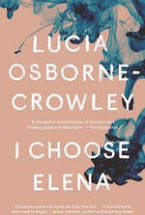I Choose Elena (Allen and Unwin 2019) is Lucia Osborne-Crowley’s extraordinary memoir of the sexual assault she suffered as a 15-year-old, the subsequent 10 years of chronic pain that followed, her courage – only two years ago – to finally break her silence and speak of her rape, and the slow road to recovery that she is now embracing.
A promising gymnast from a young age, Osborne-Crowley sailed through childhood as a girl in full control of her body and her mind, able to master the incredible physical and mental achievements that a professional athlete craves. But all that changed the night she was brutally raped by a stranger. Her body completely shut down, frozen into silence and invisibility. She told no-one. Sought no help. Felt immense shame and guilt and self-disgust. Tidied the whole incident away into a corner of her mind and pretended it had never happened, in a process that she is only now – as a young woman, a legal-trained journalist – beginning to understand: that the severe trauma inflicted on her body not only caused post-traumatic shock syndrome, but also triggered irreparable chronic pain and inflammatory responses from her organs, her immune system and her nervous system, resulting in undiagnosed and often unbelieved pain and suffering. Her research has now led her to understand the undeniable link between undisclosed or untreated trauma and the development of certain chronic diseases such as endometriosis and Crohn’s Disease; the connection between silence and the body shutting down.
This is an uncomfortable read but an important one. Content may be triggering or confronting. But for some readers, this will be the book they have been waiting for: the book that allows them to finally hear their own voice and to allow others to help with their pain.
Lucia Osborne-Crowley’s story is particular to her own circumstances but this book is backed up by references, studies, research, and medical and psychiatric evidence. If books such as Bri Lee’s Eggshell Skull, Meera Atkinson’s Traumata or Gabrielle Jackson’s Pain and Prejudice resonated with you, then this will also have something to offer. And if you are interested in the response to and the treatment of women’s pain, sexual violence, the credibility of survivors, the abuse of perpetrators, and the way in which all of this is managed through the judicial, political, medical and mental health spheres, this book will provide much food for thought.
The writing of I Choose Elena (a reference to choosing to embrace the literature of Elena Ferrante to aid recovery) is a brave journey by a courageous young woman. Although the sexual assault occurred 10 years ago, the author’s disclosure (followed quite quickly by the writing of this book) is relatively recent, and the pain and trauma sit close beneath the surface. Hearing Lucia Osborne-Crowley speak at a recent event reassured me that she has developed a supportive network around her, and also that giving herself the permission to speak out really seems to be a crucial step in her recovery because she feels she is encouraging other young women to also step out of the shadows, to become visible, and to be heard. Sometimes recounting trauma is itself further traumatising, but sometimes discovering your body and your emotions, and recognising your pain, is a powerful and strengthening strategy towards healing.

